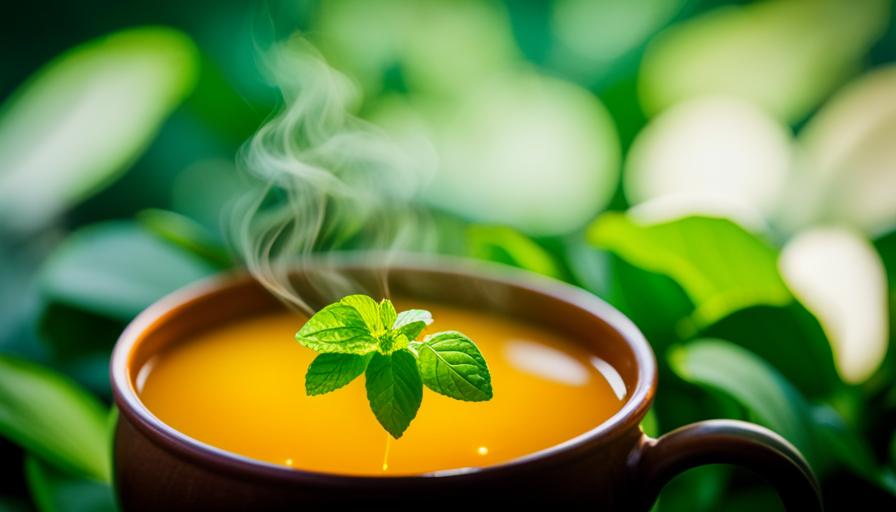Are you interested in trying turmeric powder in your tea? Turmeric has been a popular spice and medicinal herb for many years. It is prized for its bright color, distinct flavor, and possible health-boosting properties.
Turmeric contains compounds called curcuminoids, which have anti-inflammatory and antioxidant properties. Drinking turmeric tea may help reduce inflammation, improve brain function, and lower the risk of chronic diseases such as cancer and heart disease.
However, it’s important to choose the right type of turmeric powder and prepare it correctly to maximize its benefits. In this article, we’ll explore the benefits of turmeric tea, how to choose the right turmeric powder, and how to prepare and brew turmeric tea. We’ll also provide some delicious turmeric tea recipes and discuss other ways to use turmeric powder.
Key Takeaways
- Turmeric powder can be used for making tea and may offer potential health benefits such as reducing inflammation, improving brain function, and promoting healthy skin.
- Choosing the right type of powder with at least 3% curcumin content and preparing it correctly is important for maximizing benefits.
- Adding other spices like ginger or cinnamon, as well as lemon, ginger, and honey, can enhance the flavor and increase curcumin absorption.
- Turmeric supplements and alternative remedies like golden milk, turmeric paste, and turmeric shots offer higher doses of beneficial compounds. However, turmeric should be used with caution and under the guidance of a healthcare provider, as it can interact with certain medications and cause allergic reactions.
Benefits of Turmeric Tea
You’ll be delighted to know that incorporating turmeric powder in your tea not only adds a warm, spicy flavor, but also provides a plethora of health benefits due to its anti-inflammatory and antioxidant properties.
Turmeric tea benefits include reducing inflammation in the body, which can help alleviate symptoms of arthritis and other inflammatory conditions. In addition, turmeric has been shown to improve brain function and reduce the risk of heart disease.
The anti-inflammatory properties of turmeric are due to the compound curcumin, which is found in high amounts in turmeric powder. Studies have shown that curcumin can block inflammatory pathways in the body, reducing inflammation and pain.
So, by adding turmeric powder to your tea, you can not only enjoy a delicious beverage, but also help prevent chronic diseases and improve your overall health.
Now, let’s talk about choosing the right turmeric powder for your tea.
Choosing the Right Turmeric Powder
When it comes to making a perfect cup of golden milk, choosing quality turmeric powder is crucial. Not all turmeric powders are created equal, and the potency and flavor can vary greatly depending on the sourcing options and processing methods.
Here are some tips to help you select the right turmeric powder for your tea:
- Check the curcumin content: A good quality turmeric powder should have at least 3% curcumin content, which is the active ingredient in turmeric that gives it its anti-inflammatory and antioxidant properties.
- Look for organic: Choosing an organic option can ensure that you are consuming a safer and healthier product since turmeric is often treated with pesticides and other harmful chemicals.
- Select a bright yellow powder: The color of the turmeric powder is a good indicator of its quality. A bright yellow powder is usually fresher and has more flavor than a dull yellow or brownish powder.
By choosing the right type of turmeric powder, you can ensure that your turmeric tea has a rich color, potent flavor, and maximum health benefits. Now that you’ve selected your turmeric powder, it’s time to prepare for your tea.
Preparing for Turmeric Tea
Get ready to spice up your beverage game with a warm and invigorating cup of golden elixir that’ll give you a burst of sunshine on a dreary day.
Turmeric tea is a great way to enjoy the many benefits of this powerful spice. It’s anti-inflammatory and antioxidant properties can help boost your immune system and reduce inflammation in your body.
In addition, turmeric tea can also improve digestion, ease joint pain, and promote healthy skin. There are many variations of turmeric tea that you can try depending on your taste preferences. You can add ginger, lemon, honey, or black pepper to enhance the flavor and increase the health benefits.
So why not give yourself a treat and try a cup of turmeric tea today? The next section will guide you through the process of brewing turmeric tea.
Brewing Turmeric Tea
To brew a delicious cup of golden elixir, it’s important to start with fresh ingredients and high-quality spices. When making turmeric tea, it’s best to use fresh turmeric root or high-quality turmeric powder.
To infuse turmeric into other beverages, you can add it to your favorite smoothies or juices. For those who want to incorporate turmeric into food recipes, it can be added to soups, curries, stir-fries, and even scrambled eggs.
To brew turmeric tea, start by boiling water in a saucepan and adding fresh or powdered turmeric. Simmer the mixture for about 5-10 minutes to allow the flavors to infuse. You can add other spices, such as ginger or cinnamon, to enhance the flavor of your tea.
Once the tea is ready, strain it into a cup and add honey or lemon to taste. Now that you know how to brew turmeric tea, let’s explore how to add even more flavor to this delicious and healthy beverage.
Adding Flavor to Turmeric Tea
Now, to add some flavor to your golden elixir, you can try infusing it with warming spices like cinnamon and ginger, or sweetening it with honey or agave nectar.
Turmeric tea is known for its strong and earthy taste, but it doesn’t have to be overwhelming. You can experiment with different flavor combinations to find the perfect balance for your taste buds. For example, you can add a dash of nutmeg or cardamom to your turmeric tea for a warm and cozy aroma. Alternatively, you can mix in some lemon or lime juice for a zesty twist.
In addition to being a delicious beverage, turmeric tea has alternative uses. You can use it as a base for a smoothie or a latte, or even add it to your favorite soup or stew recipe.
The possibilities are endless! By incorporating turmeric into your diet, you can maximize its health benefits and support your overall wellbeing.
Maximizing Health Benefits
Now that you know how to add flavor to your turmeric tea, let’s talk about how to maximize its health benefits. Adding ingredients like lemon, ginger, and honey can enhance the taste of your tea and increase the absorption of curcumin, the active ingredient in turmeric.
However, if you’re looking to get the most out of your turmeric tea, you may want to consider adding turmeric supplements or exploring alternative remedies. Turmeric supplements come in different forms, including capsules, powders, and extracts. They offer a higher dose of curcumin than what is typically found in turmeric powder.
Alternative remedies like golden milk, turmeric paste, and turmeric shots can provide a potent dose of curcumin and other beneficial compounds. These remedies can be easily made at home and can be a delicious way to incorporate turmeric into your daily routine.
To take your turmeric tea game to the next level, let’s explore some delicious turmeric tea recipes.
Turmeric Tea Recipes
Let’s dive into some tasty recipes that incorporate the powerful benefits of turmeric. Turmeric has been used for centuries in Ayurvedic medicine for its anti-inflammatory and antioxidant properties. Adding turmeric to your tea is an easy way to incorporate this potent spice into your daily routine.
Here are three turmeric tea recipes that are not only delicious but also nutritious:
-
Turmeric latte: Heat up your milk of choice, add a teaspoon of turmeric powder, a pinch of black pepper, and a sweetener of your choice. Mix well and enjoy this creamy and comforting drink.
-
Turmeric iced tea: Brew some black tea and let it cool down. Add a teaspoon of turmeric, a squeeze of lemon, and a sweetener of your choice. Serve over ice for a refreshing and invigorating drink.
-
Golden milk tea: Heat up your milk of choice, add a teaspoon of turmeric powder, a pinch of cinnamon, ginger, and black pepper. Mix well and enjoy this warm and cozy drink before bed.
Incorporating turmeric into your tea is a simple and tasty way to reap the health benefits of this powerful spice. However, there are other ways to use turmeric powder that can enhance your overall wellness.
Other Ways to Use Turmeric Powder
You may be surprised to learn that turmeric can do much more than just add flavor to your tea. This spice has been used for centuries in cooking and traditional medicine for its numerous health benefits. In fact, cooking with turmeric can be a great way to incorporate it into your diet and reap its many benefits.
Not only is turmeric great for adding flavor and color to dishes, but it also has anti-inflammatory and antioxidant properties that can help with various health issues. Additionally, turmeric has been found to have beauty benefits, such as reducing acne and improving skin complexion. So, next time you’re in the kitchen, consider adding some turmeric powder to your meals for a boost of flavor and health benefits.
| Benefit | Evidence | How to Use |
|---|---|---|
| Anti-inflammatory | Studies have shown that turmeric can help reduce inflammation in the body. | Add turmeric powder to curries, soups, or roasted vegetables. |
| Antioxidant | Turmeric contains compounds that have antioxidant properties, which can help protect against cell damage. | Add turmeric powder to smoothies or make a turmeric latte. |
| Digestive aid | Turmeric has been used in traditional medicine to help with digestive issues, such as bloating and gas. | Mix turmeric powder with warm water and drink as a tea. |
| Skin health | Turmeric has been found to have anti-inflammatory and antibacterial properties that can help with acne and improve skin complexion. | Mix turmeric powder with honey and yogurt to make a face mask. |
| Brain health | Studies have shown that turmeric may improve brain function and reduce the risk of brain diseases. | Add turmeric powder to your morning oatmeal or smoothie. |
As with any supplement or spice, it’s important to be mindful of potential side effects. Let’s take a look at some of the possible adverse effects of consuming turmeric in the next section.
Potential Side Effects
Before you start using turmeric powder, it’s important to be aware of potential side effects. Some medications can interact with turmeric, so it’s important to talk to your doctor if you’re taking any prescription drugs.
Additionally, some people may experience allergic reactions or digestive issues when using turmeric powder. Keep these considerations in mind to ensure safe and effective use of turmeric.
Interactions with Medications
If you’re currently taking any medications, it’s important to speak with your healthcare provider before adding turmeric powder to your tea, as it may interact with some medications.
Turmeric has been shown to have a number of potential health benefits, including anti-inflammatory and antioxidant properties. However, it also contains compounds that can interfere with certain medications, particularly those that affect blood clotting or blood sugar levels.
Some medication precautions you should keep in mind include avoiding turmeric if you are taking blood thinners like warfarin or aspirin, as well as diabetes medications. Turmeric may also interact with certain chemotherapy drugs, so it’s important to let your doctor know if you are undergoing cancer treatment.
By speaking with your healthcare provider, you can better understand any contraindications with drugs and make an informed decision about whether or not to add turmeric powder to your tea.
Moving onto the subsequent section about allergic reactions, it’s important to note that while turmeric is generally considered safe for most people, it can cause allergic reactions in some individuals.
Allergic Reactions
Interestingly enough, while turmeric is often touted for its health benefits, some individuals may experience allergic reactions to this spice. Turmeric contains a compound called curcumin, which can cause allergic reactions in some people. Symptoms of a turmeric allergy can include hives, itching, swelling, and difficulty breathing. If you experience any of these symptoms after consuming turmeric, it’s important to seek medical attention immediately.
Managing symptoms of a turmeric allergy may involve avoiding turmeric and finding alternative options for your tea. Some alternatives to turmeric include ginger, cinnamon, and cardamom, which can also provide health benefits. It’s important to read food labels carefully and ask about ingredients when dining out to avoid accidentally consuming turmeric. If you have a severe allergy to turmeric, it may be necessary to carry an emergency epinephrine auto-injector with you at all times.
With proper management and alternative options, individuals with a turmeric allergy can still enjoy a variety of teas and spices without experiencing allergic reactions.
Moving on to digestive issues, it’s important to note that turmeric may also have some potential side effects on the digestive system.
Digestive Issues
Let’s dive into the potential impact of turmeric on our digestive system. While turmeric has been traditionally used as a home remedy for digestive issues, it’s important to note that there is limited scientific evidence to support its effectiveness. Some individuals have reported relief from symptoms such as bloating, gas, and stomach pain after consuming turmeric supplements or adding turmeric powder to their tea. However, it’s important to consult with a healthcare provider before using turmeric as a treatment for digestive issues, as it may interact with certain medications or exacerbate existing conditions.
To help you better understand the potential impact of turmeric on your digestive system, here is a table outlining the reported benefits and risks associated with consuming turmeric:
| Benefits | Risks |
|---|---|
| May improve digestion | May worsen acid reflux |
| May reduce inflammation | May cause nausea or diarrhea |
| May alleviate stomach pain | May interact with certain medications |
While turmeric may offer some benefits for individuals with digestive issues, it’s important to approach its use with caution and under the guidance of a healthcare provider. As with any supplement or home remedy, it’s important to thoroughly research the potential risks and benefits before incorporating it into your routine.
Frequently Asked Questions
Can turmeric tea be used as a substitute for medication?
Although turmeric tea benefits are being researched, it should not be used as a substitute for medication. It may have anti-inflammatory, antioxidant properties, but always consult with a healthcare professional before making any changes to your treatment plan.
Can I drink turmeric tea if I have a certain medical condition or take certain medications?
Before drinking turmeric tea, it’s important to consider medical conditions and medication interactions. Turmeric may interact with blood thinners, diabetes medication, and gastric acid reducers, and should be avoided by those with gallbladder problems or on chemotherapy.
What is the recommended daily intake of turmeric tea?
You may wonder how much turmeric tea you should drink daily. While there is no official recommendation, studies suggest 500-2000mg of curcumin, the active ingredient in turmeric, may provide health benefits. Experiment with recipe variations and enjoy the many potential benefits of turmeric tea.
Can I use fresh turmeric root instead of turmeric powder in turmeric tea?
Yes, you can use fresh turmeric root in turmeric tea. The benefits of using fresh turmeric in tea include higher levels of antioxidants and anti-inflammatory compounds. Grate or thinly slice the root and steep in hot water for 10-15 minutes.
Can I add milk to my turmeric tea?
Like a warm sun rising over the horizon, adding milk to your turmeric tea can create a smooth and creamy texture. This can also enhance the absorption of turmeric’s health benefits, such as reducing inflammation and improving brain function.
Conclusion
Congratulations! You’re now equipped with the knowledge on how to make the perfect cup of turmeric tea using turmeric powder.
Remember, turmeric tea is not only delicious but also beneficial for your health. It can help with inflammation, immune system support, and digestion, among other things.
Think of turmeric tea as your personal superhero, fighting off the bad guys in your body. Just like how Superman swoops in to save the day, turmeric tea can swoop in and save your body from harmful inflammation and free radicals.
So, go ahead and give it a try! But before you do, make sure to choose the right turmeric powder and prepare it correctly to maximize its health benefits. And don’t be afraid to experiment with different flavors and recipes to make it even more enjoyable.
Turmeric tea may just become your new favorite drink!










